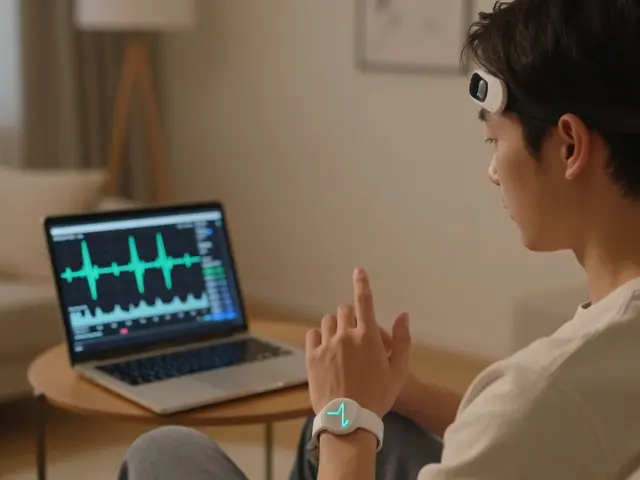
Ever find yourself reaching for a second helping when you know you shouldn't? Overeating is a common struggle, but there's a simple trick to help manage it: healthy snacking. By choosing the right snacks, you can keep hunger at bay and support your weight management goals.
Let's dive into how snacking smart can make a difference, helping you understand overeating, selecting the best snacks, and incorporating mindful eating practices.
- Understanding Overeating
- The Role of Healthy Snacks
- Choosing the Right Snacks
- Mindful Eating Tips
- Timing Your Snacks
- Creating a Snack Plan
Understanding Overeating
Overeating often happens when we consume more food than our bodies need for energy. It's a behavior that can be triggered by various factors like stress, boredom, and even the types of foods readily available. Understanding why we tend to eat more than necessary is the first step toward controlling our eating habits and making healthier choices.
One reason people overeat is due to emotional triggers. When feeling stressed or anxious, food can serve as a comforting distraction. This is known as emotional eating, which seldom involves making healthy choices. Usually, it's high-calorie, low-nutrient foods that we reach for. Managing stress through activities like exercise or meditation can be beneficial in reducing the urges to eat for comfort rather than hunger.
Another interesting contributor to overeating is food availability. In today's world, where food is convenient and often marketed to appeal to our senses, it's easy to eat even when we’re not hungry. The widespread availability of processed snacks makes it even more challenging to resist unhealthy choices.
“Humans are wired to favor high-calorie foods, which was an advantage for our ancestors who faced food scarcity,” says Dr. Jane Smith, a nutrition expert. “But in our modern world of abundance, this instinct can lead to overeating.”
Social Influences
Social settings also play a role in our eating habits. Think about social gatherings, holidays, or even family dinners. These occasions often center around food, making it easy to overindulge. Peer pressure and societal norms can nudge us to eat more than we need, which can become a hard habit to break. Recognizing these settings and preparing ahead, such as eating a small healthy snack before attending, can help mitigate overeating.
Physical Cues
Sometimes, we simply misinterpret our body's signals. Thirst can often be confused with hunger, leading us to eat when a glass of water would suffice. Additionally, not eating enough during the day can lead to excessive hunger later, causing us to overeat at dinner or snack late into the night. Balancing meals throughout the day can help keep hunger in check.
Finally, there’s the element of distraction. Eating while watching TV, working, or even scrolling through your phone can lead to mindless eating. When we’re not focused on our food, we’re less likely to notice when we’re full, making it easier to consume more than we need. Taking the time for mindful meals, where you focus solely on eating, can significantly cut down on the risk of overeating.
The Role of Healthy Snacks
Healthy snacks play a crucial role in curbing overeating, a common problem in our fast-paced world. People often find themselves munching mindlessly, consuming far more calories than needed. Snacking smartly can prevent this by keeping hunger levels in check, ensuring you don't arrive at meals feeling ravenous. This helps control portion sizes and reduces the likelihood of overeating.
Choosing the right snacks isn't just about keeping hunger at bay. It's also about providing your body with essential nutrients. For instance, snacks rich in protein and fiber take longer to digest, keeping you feeling full for longer periods. Think of snacks like Greek yogurt, nuts, and fresh fruits. These not only satisfy hunger but also contribute to your daily nutritional needs.
According to a study published in the journal 'Appetite', people who eat high-fiber snacks between meals consume 30% fewer calories at mealtimes compared to those who don't. This is an evidence-based insight into how healthy snacking can play a role in weight management. Decreasing overall calorie intake while still feeling full is a win-win situation that supports weight management goals effectively.
“Healthy snacking is not just about calories. It’s about nutrients. Choosing snacks that are rich in vitamins, minerals, and fiber can make a big difference in overall health,” says Dr. Lisa Young, a nutritionist and author. Dr. Young's words highlight an important point. Our bodies respond better to nutrient-rich foods, helping us feel satisfied and energized throughout the day.
Healthy snacks can also provide a mental break during a busy day. Taking a moment to enjoy a nutritious snack can refocus your mind, improve productivity, and reduce stress. An apple with a handful of almonds can do wonders for your brainpower during mid-afternoon slumps. This break allows you to step away from work, reset your energy levels, and return more focused.
Implementing healthy snacks into your day isn't just an automatic solution; it's a conscious lifestyle choice. It involves planning and intention. Keeping a stash of healthy options in your desk drawer, pantry, or refrigerator can help make this transition smoother. Stock up on baby carrots, hummus, or even a batch of homemade trail mix to maintain a ready supply of nutritious options. With a little preparation and mindfulness, you can successfully use **healthy snacks** to battle overeating and improve your overall health.

Choosing the Right Snacks
When it comes to curbing overeating, the snacks you choose play a crucial role. Opting for healthy snacks can help you feel full and satisfied, making it less likely you'll overindulge at meals. The key is to select snacks that are nutritious and provide a good balance of protein, fiber, and healthy fats.
First, think about protein. Protein is essential for building and repairing tissues, and it also helps keep you full. Some great high-protein snacks include Greek yogurt, nuts, and cheese. A small serving of almonds or a yogurt cup can go a long way in keeping hunger at bay. According to registered dietitian Lisa Young, "Protein helps you feel full longer and is a great option for snacking."
Next, consider fiber-rich foods. Fiber is not only good for digestion, but it also helps in controlling appetite. Fruits and vegetables are excellent sources of fiber. An apple, a handful of baby carrots, or a bowl of mixed berries can be easily incorporated into your snacking routine. These foods are also high in vitamins and minerals, providing additional nutritional benefits.
Healthy fats are another important component. These fats can be found in avocados, nuts, and seeds. They add a creamy or crunchy texture to your snacks and help you feel more satisfied. For instance, a slice of whole-grain toast topped with avocado can be a delicious and filling snack.
It's also useful to choose snacks that are low in added sugars and refined carbs. Many packaged snacks are high in these, which can lead to blood sugar spikes and crashes. Instead, opt for whole foods that provide natural sweetness and sustenance. For example, a piece of dark chocolate and a handful of nuts can satisfy a sweet craving without the added sugar.
Another tip is to keep your snack portions in check. Overeating healthy snacks can also contribute to excess calorie intake. Measure out single servings in advance. Using small containers or snack-sized bags can help you control how much you eat. This way, you avoid mindlessly munching through a large bag of nuts or a whole block of cheese.
Creating a balance in your snacks is essential. Combining protein, fiber, and fats can help balance your blood sugar levels and keep you fuller longer. Think about pairing options like apple slices with peanut butter or hummus with vegetable sticks. These combinations not only taste great but are also satisfying and nutritious.
Lastly, ensure that your snacks fit into your overall eating plan. It's important that snacks complement your main meals. They should serve as a bridge to keep you going between meals without adding too many extra calories. For instance, if you have a lighter lunch, you might need a more substantial snack later in the afternoon to tide you over until dinner.
Mindful Eating Tips
Mindful eating can be a powerful tool in your quest to curb overeating. By paying attention to your body's hunger cues and making conscious food choices, you can enhance your eating experience and avoid unhealthy patterns. One effective method is to eat slowly. When you take time to savor each bite, your brain has a chance to register fullness, which can help prevent overeating.
Additionally, using smaller plates can trick your brain into feeling satisfied with smaller portions. This visual cue can make a significant difference in how much you consume. Another useful tip is to eliminate distractions while eating. Turn off the TV, put your phone away, and focus on your meal. This helps you stay present and fully enjoy your food, leading to a more satisfying experience.
Keeping healthy snacks handy is a smart strategy. When hunger strikes, having nutritious options like fresh fruits, nuts, or yogurt within reach can prevent you from reaching for unhealthy alternatives. It's also essential to understand your emotional triggers. Many people eat out of boredom, stress, or sadness. Recognizing these triggers can help you find alternative activities or coping mechanisms other than eating.
Mindful breathing can also complement your eating habits. Before you start a meal, take a few deep breaths to center yourself. This simple act can reduce stress and enhance your awareness, making it easier to eat mindfully. Implementing these strategies can create a positive eating routine that encourages healthier choices and better weight management.
"Mindful eating is not about being perfect, always eating the right things, or foregoing the pleasure of eating. Rather, it's about focusing all your senses and being present when eating—throughout the meal." - Headspace
Hydration plays a crucial role in mindful eating. Sometimes, thirst is mistaken for hunger. Drinking a glass of water before eating can prevent unnecessary snacking. Incorporating these simple, mindful eating practices can profoundly affect your relationship with food, helping you make more deliberate and healthy choices.

Timing Your Snacks
Understanding when to eat your snacks can be as crucial as what you choose to snack on. It’s not just about grabbing something when you feel hungry; there’s an art to timing that can help curb overeating and keep your energy levels stable throughout the day. Here's how you can master the timing of your healthy snacks.
Research suggests that eating smaller, balanced snacks every 3-4 hours can help maintain your blood sugar levels, prevent that afternoon energy slump, and deter the kind of hunger that leads to overeating. This regular intake signals to your body that it doesn’t need to go into starvation mode, which means you’re less likely to binge later.
Breakfast is often called the most important meal of the day, but mid-morning and mid-afternoon snacks play an equally vital role. Having a mid-morning snack can bridge the gap between breakfast and lunch, preventing you from becoming too hungry and overeating during lunch. Similarly, a healthy snack between lunch and dinner can keep your metabolism active and fend off pre-dinner hunger pangs.
"Snacking should be an art, not just a filler between meals. When done right, it can contribute significantly to a healthy diet and energy balance," says Lisa Young, a registered dietitian and nutritionist.
Choosing the right time to snack is also about listening to your body. Recognize the difference between physical hunger and emotional eating. Sometimes, we reach for snacks out of boredom or stress rather than actual hunger. Take a moment to assess why you’re reaching for that snack. This mindfulness can be key to understanding your eating habits and making healthier choices.
To further optimize your snacking schedule, consider pairing your snacks with activities. For example, if you have a workout planned, a small, protein-rich snack an hour before can fuel your exercise, while a balanced snack post-workout can aid in recovery. For office-goers, timing your snacks around your breaks can also provide a much-needed mental break and re-energize you for the next task.
A helpful tip is to plan your snack times at the start of your day or week. Carrying prepped snacks makes it easier to stick to your schedule and avoid unhealthy, impulse eating. This structured approach helps keep your hunger in check and supports your weight management goals more efficiently.
Practical Tips for Snack Timing
- Mid-morning: A small fruit or yogurt.
- Mid-afternoon: Nuts or veggie sticks with hummus.
- Pre-workout: A banana or a handful of berries.
- Post-workout: A protein shake or some cottage cheese.
With these tips and a bit of mindfulness, you can make snack timing work in your favor. Remember, the goal is to maintain steady energy levels and prevent overeating later in the day. By incorporating these strategies into your daily routine, you can enjoy snacking without the guilt and maintain a healthy, balanced diet.
Creating a Snack Plan
Creating a well-thought-out snack plan can be a game-changer in your journey to curb overeating. It’s not just about picking any snack; it’s about selecting the right snacks that are nutritious and satisfying. This approach helps reduce those sudden hunger pangs and prevents you from reaching for unhealthy options impulsively. To start, make a list of healthy snacks you enjoy. Think about fresh fruits, vegetables, nuts, and yogurts. Mix it up to keep things interesting and avoid boredom.
When you plan your snacks, portion control is key. Instead of grabbing a whole bag of nuts, pre-portion them into small bags or containers. This can help you avoid eating too much in one sitting. The same goes for fruits and veggies; cutting them up in advance makes healthy choices more convenient. You’re more likely to eat a handful of baby carrots if they’re ready to go.
"Planning your snacks in advance can significantly reduce the chances of overeating and help maintain energy levels throughout the day," says registered dietitian Samantha Cassetty.
Timing is also crucial. Spread your snacks evenly throughout the day to keep your metabolism stable and your energy levels consistent. Try to have a snack mid-morning and another mid-afternoon. This can prevent you from becoming overly hungry and making poor food choices during main meals. Another tip is to listen to your body. Are you really hungry, or just bored? Sometimes a glass of water can help determine if it’s true hunger or just a craving.
For those who love data, keeping a food diary can be helpful. Write down what you eat and when you eat it. This can reveal patterns in your eating habits and help you adjust your snack plan. Studies have shown that people who keep a food diary are more successful at losing weight and keeping it off. To make this task easier, there are several apps available that can help you track your food intake on the go.
Sample Snack Plan
Here’s a simple sample plan to get you started:
- Mid-Morning: A small apple and a handful of almonds
- Mid-Afternoon: Greek yogurt with a drizzle of honey and some blueberries
- Evening: Baby carrots with hummus
Customize this plan based on your preferences and nutritional needs. Including a variety of snacks is important to ensure you get a range of nutrients. Don’t be afraid to add in some of your favorites, too, as long as they fit into your nutritional goals.
Remember, creating a snack plan is about making healthy eating more manageable and enjoyable. By choosing the right snacks and planning ahead, you can maintain your energy levels, support your weight management goals, and reduce the likelihood of overeating.





